Published
- 12 min read
Linode Alternatives in 2025: Top Cloud Platforms Compared

Introduction
If you are researching Linode alternatives, it usually means you are evaluating cloud hosting providers that offer more than just basic virtual machines. Linode has built a reputation among developers and startups for its affordable pricing and simple infrastructure management, making it a go-to choice for small projects. However, as businesses scale, many teams find themselves needing better global coverage, stronger automation, enterprise-grade security, and cost optimization that Linode alone cannot always provide.
This guide will give you a comprehensive look at the best Linode alternatives in 2025, comparing features, pricing, and ideal use cases. You will discover which platforms are best suited for startups, growing SaaS companies, and enterprises with advanced requirements. Finally, we will also introduce Kuberns, a modern AI-powered deployment platform that not only simplifies DevOps but also delivers up to 40% savings on AWS-backed infrastructure.
Why Consider Linode Alternatives?
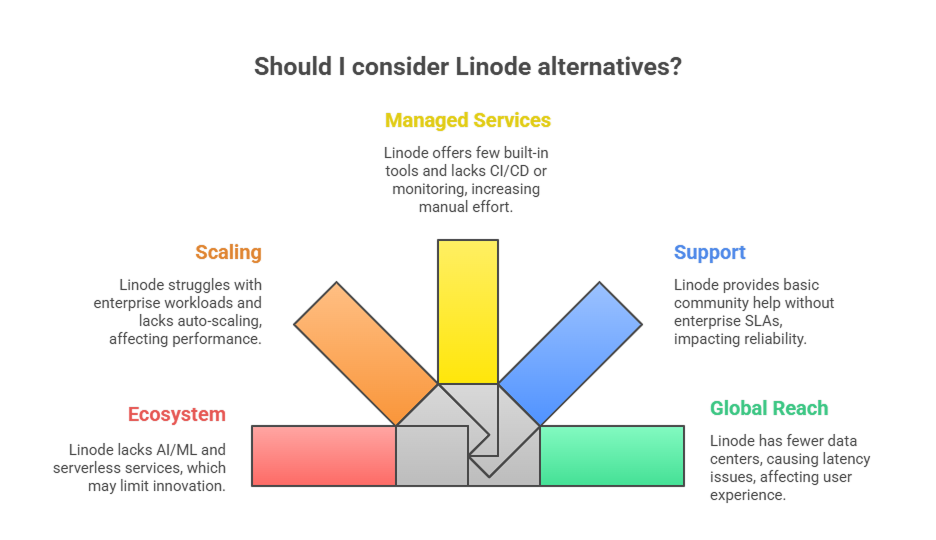 Linode has been a trusted platform for developers and startups because of its low-cost virtual machines and simple hosting experience. For smaller projects, it often provides everything you need to get started. However, when teams begin to scale or require advanced features, many realize they need to evaluate the best Linode alternatives to avoid limitations that slow down growth.
Linode has been a trusted platform for developers and startups because of its low-cost virtual machines and simple hosting experience. For smaller projects, it often provides everything you need to get started. However, when teams begin to scale or require advanced features, many realize they need to evaluate the best Linode alternatives to avoid limitations that slow down growth.
Here are some of the main reasons businesses explore cloud hosting options beyond Linode:
- Ecosystem depth: Linode delivers essential compute and storage, but it lacks the rich ecosystem of services available with larger providers. Platforms like AWS and Azure offer advanced features such as machine learning, data analytics, and serverless computing. If you want to learn more about how to maximize savings while using AWS, see our guide on how to implement cost optimisation on AWS for growing companies.
- Scaling flexibility: Linode works well for small deployments, but enterprise-level workloads often need auto-scaling, load balancing, and global redundancy. Alternatives such as Kuberns, which is built on AWS infrastructure, handle scaling automatically while cutting costs by up to 40 percent. Learn more in What Is Kuberns? The Simplest Way to Build, Deploy, and Scale Full-Stack Apps.
- Managed services: Today’s developers depend on managed databases, monitoring, CI/CD pipelines, and integrated DevOps tools. Linode provides the basics, but competitors offer complete ecosystems where all these services are built in. For example, Kuberns includes monitoring, logs, and AI-driven deployments out of the box, eliminating the need for multiple third-party tools.
- Support and SLAs: While community-driven support may be fine for hobby projects, companies that require guaranteed uptime need more robust options. Alternatives like Azure provide enterprise-grade service agreements, and platforms like Kuberns combine reliability with simplified pricing models. See our detailed breakdown of Azure alternatives if you are comparing options.
- Global infrastructure: Linode has fewer data center locations compared to hyperscalers. This can lead to latency issues for businesses with international users. Providers with broader reach, such as AWS or Google Cloud, offer stronger global performance. If you need a cost-friendly solution in Europe, you can also check our guide on best OVH alternatives.
In summary, Linode works well for basic VPS hosting, but the moment you need automation, global reach, managed services, and cost optimisation, you will benefit from exploring Linode alternatives.
Key Criteria to Compare Linode Alternatives
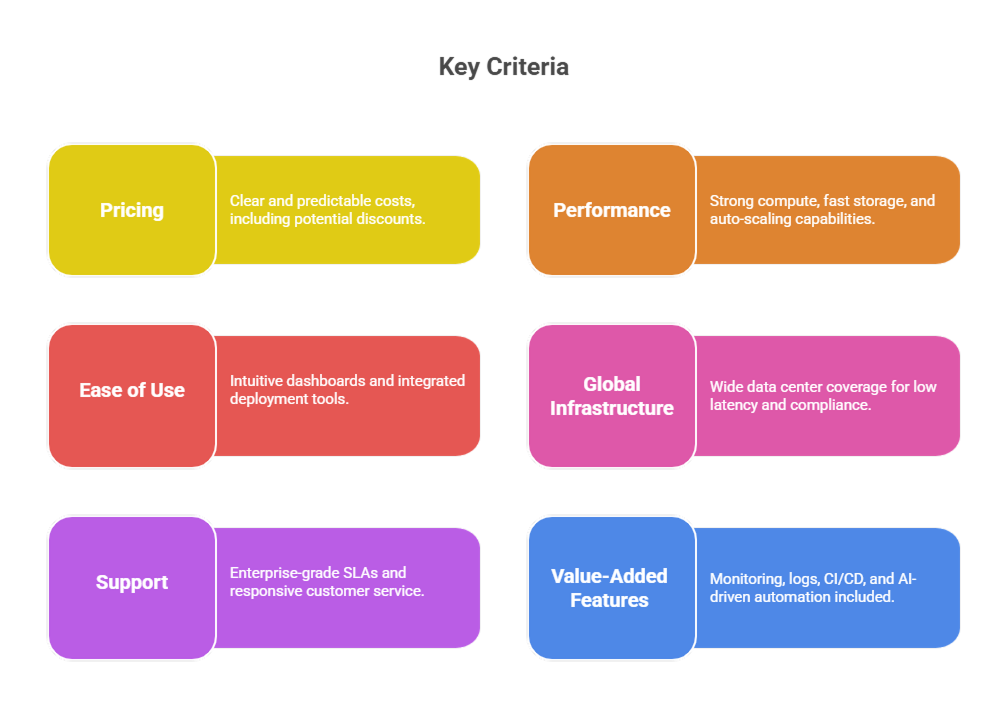 When evaluating the best Linode alternatives, it is important to go beyond pricing and look at the features that will actually impact long-term scalability and performance. Below are the key factors you should consider when choosing a replacement:
When evaluating the best Linode alternatives, it is important to go beyond pricing and look at the features that will actually impact long-term scalability and performance. Below are the key factors you should consider when choosing a replacement:
- Pricing and billing transparency: Some providers advertise low entry costs but become expensive as usage increases. Linode uses flat pricing, which is simple to understand, but hyperscalers often rely on complex pay-as-you-go models. Platforms like Kuberns solve this by offering AWS-backed infrastructure with up to 40 percent savings and clear pricing models. For more details, see our guide on how to implement cost optimisation on AWS.
- Performance and scalability: Look at compute power, storage speed, and the ability to scale workloads as your traffic grows. Linode offers solid performance for small to medium projects, but for enterprise-level scaling, solutions like AWS or Kuberns provide built-in auto-scaling and resource optimisation that reduce manual intervention.
- Ease of use: Developer experience is critical. A cloud platform should offer intuitive dashboards, APIs, and automation tools. Linode is simple to start with, but Kuberns takes this further with one-click Git deployments and integrated CI/CD pipelines, helping teams focus on building instead of managing infrastructure.
- Global infrastructure: If your users are spread across multiple regions, you need data centers close to them to reduce latency and ensure compliance with local regulations. Linode has a limited footprint compared to larger players. Alternatives like AWS and Azure have extensive global networks. If you are exploring similar providers, you can check our breakdown of Azure alternatives.
- Support and community: Reliable support and strong documentation can save time and reduce downtime. Linode’s community is strong, but enterprise teams often need faster response times and service level agreements. Competitors like Azure provide robust enterprise support, while Kuberns combines responsive support with built-in automation to reduce the need for manual troubleshooting.
- Value-added features: Modern businesses require more than just servers. Managed databases, integrated monitoring, CI/CD pipelines, and AI-driven resource management can save significant time and cost. Linode has limited offerings in this area, while Kuberns provides all-in-one deployment, monitoring, and scaling, eliminating the need for multiple third-party tools.
By keeping these criteria in mind, you can select a Linode alternative that not only meets your current needs but also positions your business for long-term growth.
Top Linode Alternatives in 2025
When comparing the best Linode alternatives in 2025, it is important to look at platforms that balance affordability, scalability, and developer experience. Below are the top options businesses and developers consider when moving beyond Linode.
1. Kuberns – AI-Powered Cloud Deployment Platform
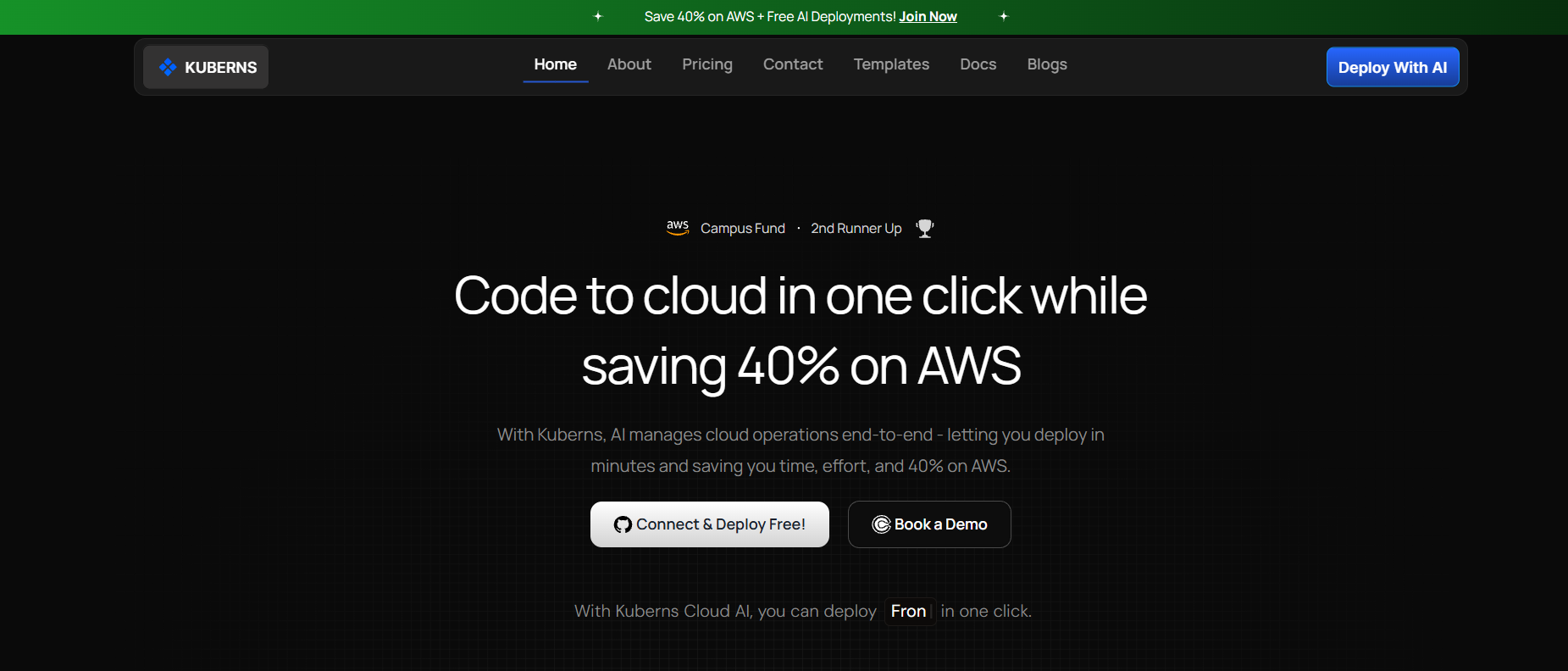 Kuberns goes beyond being a typical VPS provider. It is an AI-driven cloud deployment platform that removes the complexity of DevOps by automating everything from scaling to monitoring to cost optimisation. Unlike traditional providers that only give you raw servers, Kuberns runs your applications on AWS-backed infrastructure while reducing cloud bills by up to 40 percent.
Kuberns goes beyond being a typical VPS provider. It is an AI-driven cloud deployment platform that removes the complexity of DevOps by automating everything from scaling to monitoring to cost optimisation. Unlike traditional providers that only give you raw servers, Kuberns runs your applications on AWS-backed infrastructure while reducing cloud bills by up to 40 percent.
Key highlights of Kuberns:
- One-click Git-based deployments that work seamlessly with any framework.
- AI-powered scaling and resource optimisation that adapt to workload changes automatically.
- No need to hire a dedicated DevOps team because Kuberns handles automation for you.
- Transparent AWS pricing with up to 40 percent cost savings already built in.
- Integrated monitoring, logs, and alerts for full visibility into your applications.
For businesses that want a modern Linode alternative without the hassle of managing infrastructure, Kuberns is one of the most powerful and cost-efficient solutions available today.
👉 Learn more: What Is Kuberns? The Simplest Way to Build, Deploy, and Scale Full-Stack Apps
2. DigitalOcean
 DigitalOcean is often the first provider developers consider when moving away from Linode. It offers simple cloud infrastructure with droplets (VMs), managed Kubernetes, and managed databases. The platform is known for its clean dashboard and beginner-friendly experience.
DigitalOcean is often the first provider developers consider when moving away from Linode. It offers simple cloud infrastructure with droplets (VMs), managed Kubernetes, and managed databases. The platform is known for its clean dashboard and beginner-friendly experience.
Best for: Startups and small teams that want affordable, easy-to-use hosting without enterprise-level complexity.
👉 Related: Best DigitalOcean Alternatives in 2025 for Solo Devs & Startups
3. AWS (Amazon Web Services)
 AWS is the global leader in cloud infrastructure and offers thousands of services, from compute and storage to AI, analytics, and security. It is more complex and often more expensive than Linode, but its scale and reliability are unmatched.
AWS is the global leader in cloud infrastructure and offers thousands of services, from compute and storage to AI, analytics, and security. It is more complex and often more expensive than Linode, but its scale and reliability are unmatched.
Best for: Enterprises and fast-scaling startups that need advanced services, global infrastructure, and enterprise-grade reliability.
👉 Related: How to Implement Cost Optimisation on AWS for Growing Teams
4. Vultr
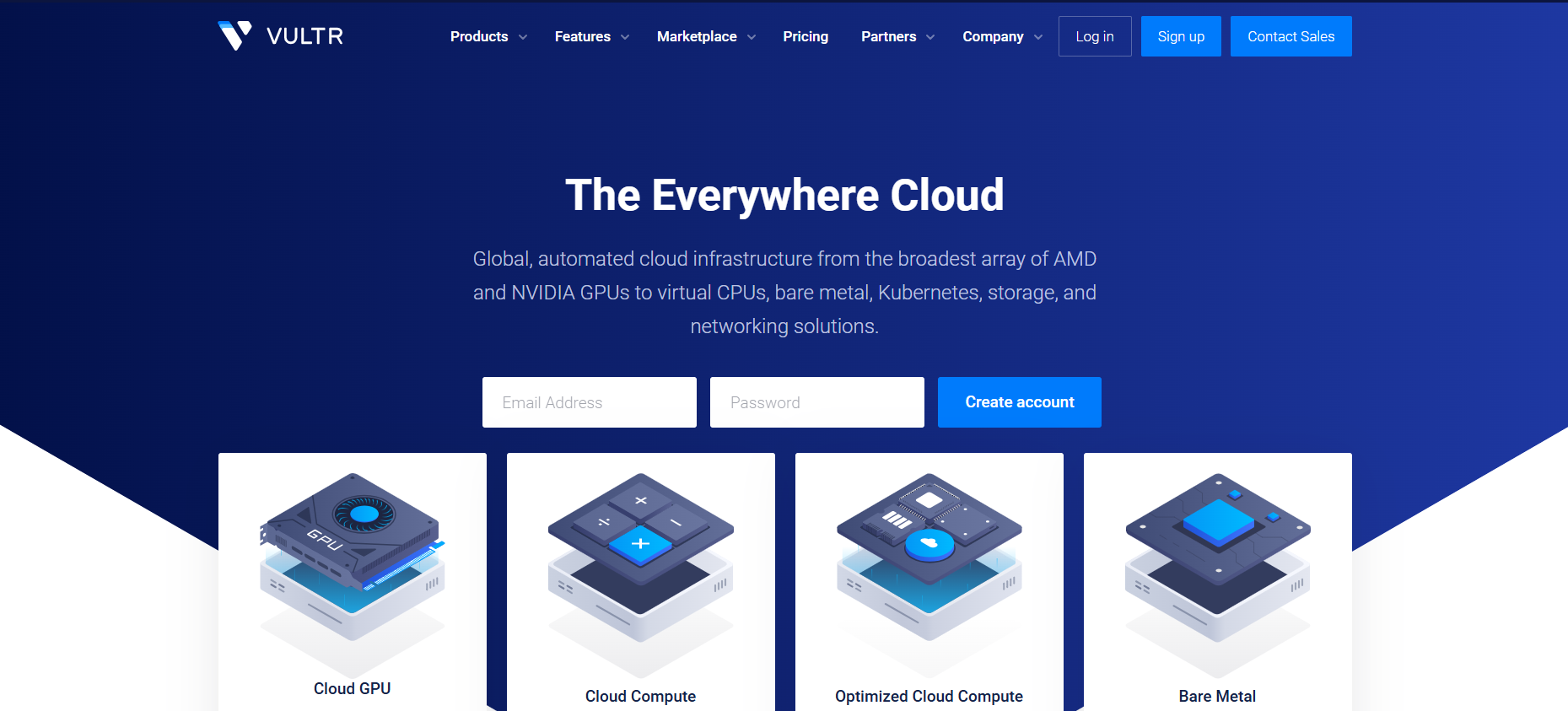 Vultr competes directly with Linode and DigitalOcean, offering affordable virtual machines with high-performance SSD storage. It has expanded its global presence and provides options for bare metal servers in addition to standard VMs.
Vultr competes directly with Linode and DigitalOcean, offering affordable virtual machines with high-performance SSD storage. It has expanded its global presence and provides options for bare metal servers in addition to standard VMs.
Best for: Developers who want budget-friendly cloud hosting with better performance and more regions than Linode.
👉 Related: The Best Vultr Alternative: Top 10 Picks in 2025
5. Hetzner
 Hetzner is a Europe-based cloud and dedicated server provider known for its extremely low prices. While it delivers strong value, its global reach is limited compared to larger providers.
Hetzner is a Europe-based cloud and dedicated server provider known for its extremely low prices. While it delivers strong value, its global reach is limited compared to larger providers.
Best for: Cost-conscious European businesses that prioritize affordability over advanced features.
👉 Related: 10 Top Hetzner Alternatives You Should Consider Today
6. Google Cloud Platform (GCP)
 Google Cloud is widely used for data-intensive applications and AI/ML workloads. It integrates seamlessly with Google services, provides generous free-tier credits, and offers enterprise-grade reliability.
Google Cloud is widely used for data-intensive applications and AI/ML workloads. It integrates seamlessly with Google services, provides generous free-tier credits, and offers enterprise-grade reliability.
Best for: Teams building SaaS products, AI models, or big data projects that require global scalability.
7. Microsoft Azure
 Azure is Microsoft’s cloud solution and a strong alternative to Linode for businesses that rely on the Microsoft ecosystem. It offers hybrid cloud solutions, global availability, and integrations with tools like Office 365 and Active Directory.
Azure is Microsoft’s cloud solution and a strong alternative to Linode for businesses that rely on the Microsoft ecosystem. It offers hybrid cloud solutions, global availability, and integrations with tools like Office 365 and Active Directory.
Best for: Enterprises that already use Microsoft products and want a reliable hybrid cloud setup.
👉 Related: Azure Alternatives: Affordable Options for 2025
8. Kamatera
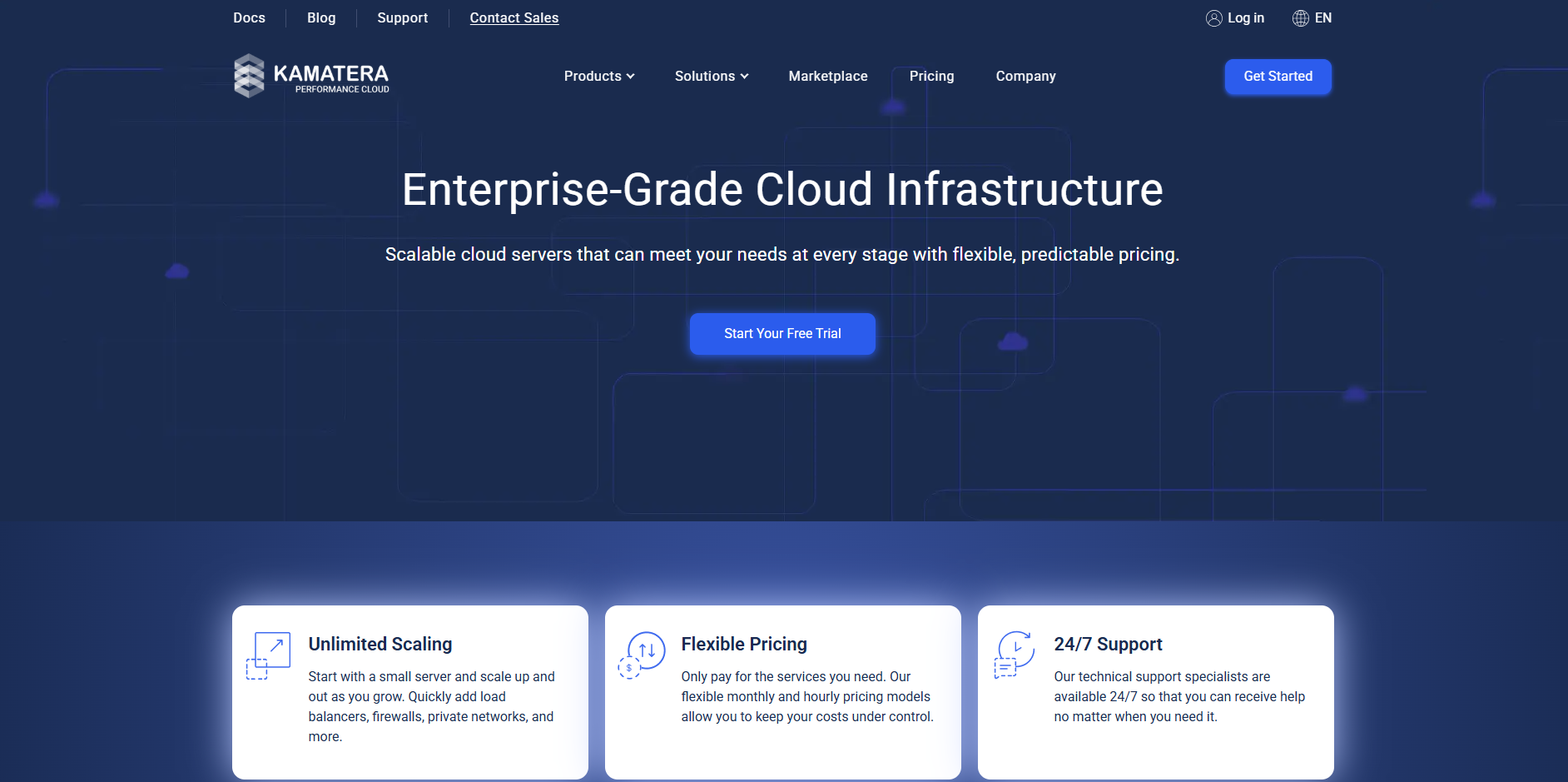 Kamatera provides a highly flexible cloud infrastructure with pay-per-minute billing and customizable server options. It is widely available across multiple regions and allows businesses to configure servers to match specific needs.
Kamatera provides a highly flexible cloud infrastructure with pay-per-minute billing and customizable server options. It is widely available across multiple regions and allows businesses to configure servers to match specific needs.
Best for: Businesses that want flexible infrastructure, global reach, and freedom from vendor lock-in.
👉 Related: Best Kamatera Alternatives for Businesses looking for cloud solutions
Why Kuberns Is the Right Choice for You
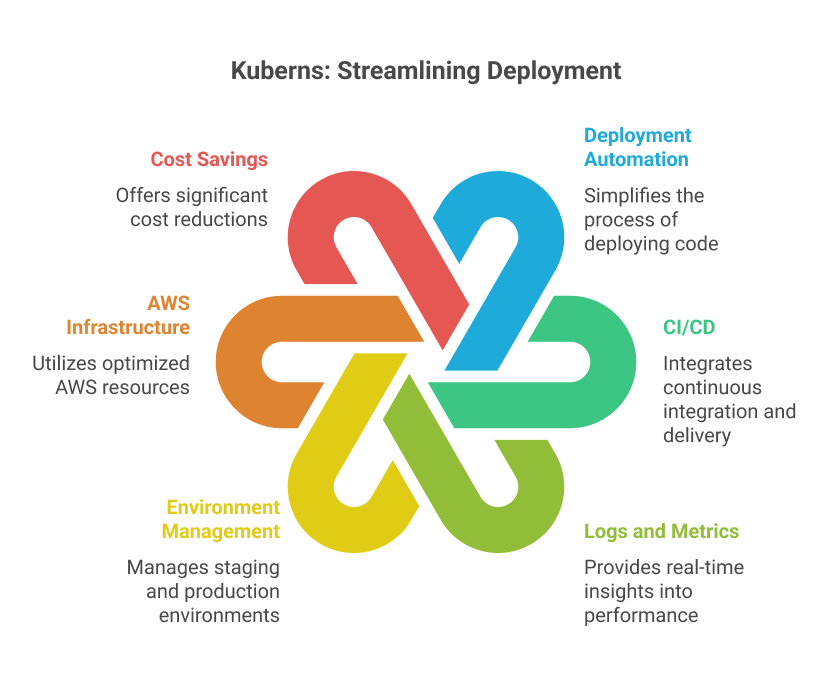 When evaluating Linode alternatives, the main challenge is finding a balance between simplicity, scalability, and cost efficiency. Many providers either give you affordable servers with limited features or enterprise-level services that come with high costs and complexity. Kuberns bridges this gap by offering a platform that is both powerful and easy to use.
When evaluating Linode alternatives, the main challenge is finding a balance between simplicity, scalability, and cost efficiency. Many providers either give you affordable servers with limited features or enterprise-level services that come with high costs and complexity. Kuberns bridges this gap by offering a platform that is both powerful and easy to use.
Here is why Kuberns could be the right fit for your business:
- Cost savings without compromises: Kuberns runs on AWS-backed infrastructure but uses AI-driven optimisation to cut your cloud bills by up to 40 percent. This means you get enterprise-grade reliability at startup-friendly pricing.
- Faster deployments: With one-click Git-based deployments, you can take your application from code to production in minutes without complex setup.
- No DevOps team needed: Kuberns handles scaling, monitoring, and infrastructure management automatically. This reduces overhead and lets your developers focus on building features instead of managing servers.
- All-in-one platform: Unlike Linode, which often requires third-party add-ons, Kuberns includes monitoring, logs, alerts, and CI/CD pipelines out of the box.
- Built for growth: Whether you are a startup, agency, or growing SaaS company, Kuberns gives you the flexibility to start small and scale globally without hitting infrastructure roadblocks.
In short, if you want the affordability of VPS providers combined with the intelligence and automation of modern cloud platforms, Kuberns is the most future-ready Linode alternative available today.
Final Thoughts
Linode remains a strong choice for budget-friendly cloud hosting, but as your needs evolve, so should your cloud strategy. Whether you’re looking for better global coverage, lower costs, or simplified deployments, the alternatives we’ve covered provide excellent options.
If you want to combine the affordability of VPS providers with the power of AWS, Kuberns stands out as the best Linode alternative in 2025. With AI-driven deployments, simplified workflows, and up to 40% cost savings, it’s designed to help teams move faster without DevOps complexity.
👉 Start Deploying Smarter with Kuberns

FAQs
1. What is the best Linode alternative for small businesses? Kuberns is ideal for small businesses because it combines AWS-backed infrastructure with simplified deployment and significant cost savings.
2. Is DigitalOcean better than Linode? DigitalOcean is very similar to Linode in pricing and simplicity. However, Linode sometimes edges ahead in support, while DigitalOcean offers broader services.
3. Can I migrate from Linode to Kuberns easily? Yes. Kuberns provides guided migration to its AWS-backed infrastructure, making the transition smooth.
4. Which Linode alternative is best for enterprises? AWS, Azure, and GCP are better suited for enterprises due to their advanced services and global infrastructure.
5. Why choose Kuberns over Linode? Kuberns removes DevOps complexity with one-click deployments, adds AI-powered cost savings, and offers enterprise-grade performance at startup-friendly prices.